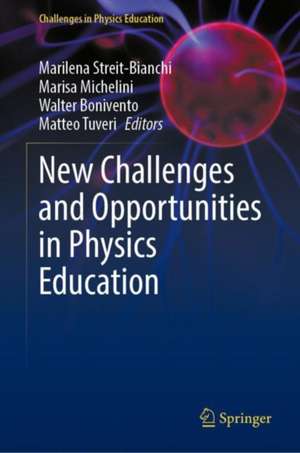New Challenges and Opportunities in Physics Education: Challenges in Physics Education
Editat de Marilena Streit-Bianchi, Marisa Michelini, Walter Bonivento, Matteo Tuverien Limba Engleză Hardback – 31 oct 2023
Preț: 740.25 lei
Preț vechi: 902.75 lei
-18% Nou
Puncte Express: 1110
Preț estimativ în valută:
141.64€ • 148.29$ • 117.20£
141.64€ • 148.29$ • 117.20£
Carte tipărită la comandă
Livrare economică 05-19 aprilie
Preluare comenzi: 021 569.72.76
Specificații
ISBN-13: 9783031373862
ISBN-10: 3031373863
Ilustrații: XIV, 437 p. 101 illus., 90 illus. in color.
Dimensiuni: 155 x 235 mm
Greutate: 0.81 kg
Ediția:1st ed. 2023
Editura: Springer Nature Switzerland
Colecția Springer
Seria Challenges in Physics Education
Locul publicării:Cham, Switzerland
ISBN-10: 3031373863
Ilustrații: XIV, 437 p. 101 illus., 90 illus. in color.
Dimensiuni: 155 x 235 mm
Greutate: 0.81 kg
Ediția:1st ed. 2023
Editura: Springer Nature Switzerland
Colecția Springer
Seria Challenges in Physics Education
Locul publicării:Cham, Switzerland
Cuprins
1. On the shoulder of giants: the “Dialogue” of Galileo (Michele Camerota).- 2. Galileo: the method of science and the law of falling bodies (Michele Camerota) What physics and all modern science owe to Galileo.- 3. Conceptual and scientific revolutions in the 20th century (Daniele Oriti, Francesco Vissani, Matteo Morganti) Dialogue on the new challenging concepts: space-time, mass, matter, probability, determinism, discretization and fields. Select philosophical issues.- From atoms to Higgs boson (Pierluigi Bortignon, Steven Goldfarb, Suchita Kulkarni) The path to discovery. The Higgs field associated with the Higgs boson gives mass to the fundamental particles. But what next.
Notă biografică
Marilena Streit-Bianchi received a doctorate in Biological Sciences from the University of Rome and joined CERN, the European Organization for Nuclear Research in Geneva (Switzerland), in 1969. She has been a pioneer in the study of high-energy particles produced by accelerators for cancer treatment. She has held managerial positions on safety training and technology transfer, has been a senior honorary staff member at CERN and is actively engaged in multidisciplinarity. She has been book editor and curator of exhibitions in Europe and Mozambique promoting art and science in particular. She is the vice president of the international association ARSCIENCIA and member of the Italian Physics Society (SIF). She has been co-editor of the book “Mare Plasticum-The Plastic Sea -Combatting Plastic Pollution Through Science and Art” Springer 2020, of the book “Advances in Cosmology” Springer nature 2022.
Marisa Michelini is full time Professor of Physics Education in the Department of Mathematics, Computer Science and Physics (DMIF) of the University of Udine, where she is from 1994 Rector Delegate for different areas and also for GEO University Consortium that she has headed since 2014.
She is responsible for the Physics Education Research Unit (URDF), which she founded in 1992. At international level from 2012 she is President of International Research Group on Physics Education (GIREP); from 2016 board member of PED Section of European Physical Society (EPS); from 2014 board member of Multimedia Physics Teaching Learning (MPTL) and from 2019 consultant of CERN for Education. Her research activity during the entire career has been devoted to innovative physics education paths on modern physics. She received in 1989 the Italian Physical Society Award for the Exhibit Games Experiments Ideas and in 2018 the IUPAP-ICPE International Award for the research in physics education.
Walter M. Bonivento, experimental physicist in astroparticle and particle physics. Senior INFN Researcher, coordinator of astroparticle physics of the Cagliari INFN Unit. He has been working for 20 years at CERN (DELPHI, LHCb, with many leadership roles) and since a few years at LNGS with the Darkside experiment as member of the executive board. He is the Scientific Director of the Aria project for the distillation of argon for the research of dark matter carried out at LNGS. Lecturer at the Physics Department of the University of Cagliari and INFN Manager of the dissemination project on Dark Matter DARK. Project leader and coordinator of Gravitas together with Mateo Tuveri and Viviana Fanti, physics-philosophical chats held from december 2021 - april 2022.
Matteo Tuveri master degree in theoretical physics and PhD with as research subjects Blackholes, holography, Dark Matter and emergent gravity. Researcher in the field of physics education and scientific dissemination. Professor of the History of Physics of the Twentieth Century, in his research he develops communication strategies and new methods for teaching physics by combining art, technology and science. He works and collaborates in close synergy with institutions, festivals and schools in the Italian territory. Since february 2019 is vice President of IdeAS (Incontri di Divulgazione e Astrofisica in Sardegna). Project leader and coordinator of Gravitas INFN project and organiser of associated public events.
Textul de pe ultima copertă
This book is invaluable for teachers and students in high school and junior college who struggle to understand the principles of modern physics and incorporate scientific methods in their lessons. It provides interactive and multidisciplinary approaches that will help prepare present and future generations to face the technological and social challenges they will face. Rather than using a unidirectional didactic approach, the authors - scientists, philosophers, communication experts, science historians and science education innovators - divide the book into two parts; the first part, “Cultural Diffusion-Relevant Aspects On Physics Research”, examines how new physics developments affect modern culture, while the second part, “Physics Education Research and Digital Challenges”, covers physics education research using ICT, plus the experiences of classroom teachers and a range of ideas and projects to innovate physics and STEM teaching.
Caracteristici
Analyses the impact of modern physics on culture and physics education Explores digital challenges and innovative approaches in physics and STEM teaching Outlines the importance of transdisciplinarity, creative thinking, and multiculturality in education






